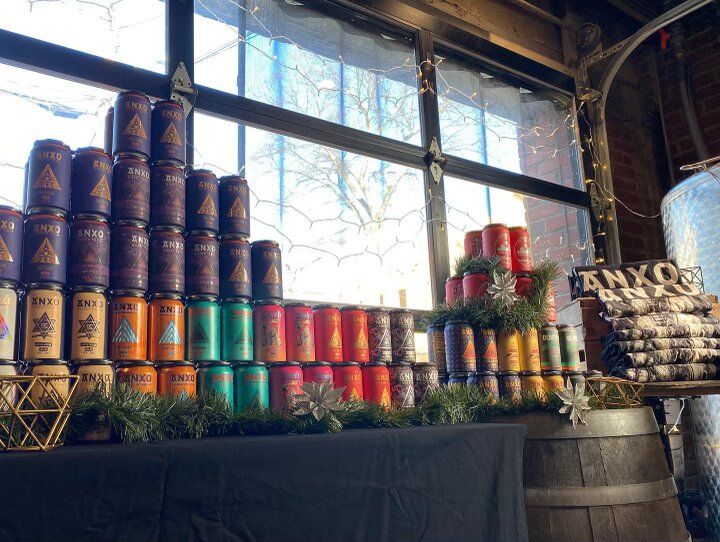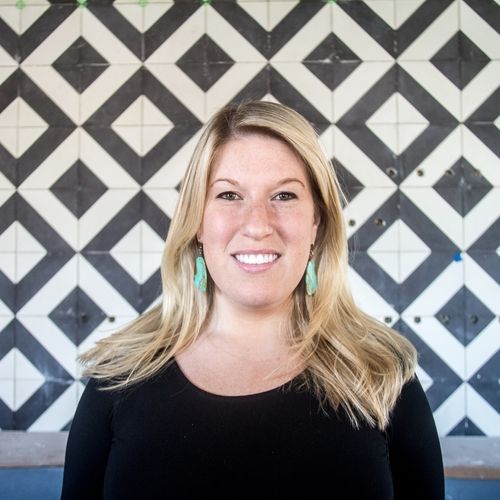Interested in starting your own entrepreneurial journey in food and beverage but unsure what to expect? Then read up on our interview with Rachel Topelius, director of operation and co-founder of ANXO, located in Washington, DC, USA.
What's your business, and who are your customers?
ANXO is DC's first licensed winery since prohibition. We make apple wine, aka cider, that is always fermented completely dry so that it's naturally sugar-free (and low carb, gluten-free, and in our case, Kosher...talk about an inclusive beverage!). What makes our cider so special is that it's all about the apple. So many of us have grown up getting perfectly shiny and crisp apples from the grocery store that are sweet and a little tart, but generally one-note. They look amazing, and they taste...okay. When it comes to making cider, it doesn't matter what the fruit looks like or what its texture is. We often call cider fruit "spitters" because of their texture and tannins. We source the best apples so that we can make cider that is all about the fruit instead of our ability to manipulate it into tasting like something else.
So many of our customers have some fond memory of cider, whether it's accidentally fermented apple juice that got left out in the sun, or neighbors with an apple tree making experimental small cider batches. There is a real sense of community around cider: it's accessible, but it's also nostalgic for many people. That sense of community is what's at the core of ANXO (pun not intended!), and we work to incorporate that into all facets of the business.

Tell us about yourself
My professional career has taken many twists and turns in a relatively short time, as it is becoming more and more common in younger generations. I started as a social worker, spending time abroad working with African refugees in Israel and in tribal areas of India, helping with access to health services. I came back to the United States, in some ways more lost than ever, and in other ways more clear on what I was looking for professionally. While helping people is my passion, I personally felt helpless working in a system that I found to be incredibly flawed. I began working at a restaurant to pay the bills while I figured out my next steps, and my life was never the same.
The service industry is a special place. You often hear people say that everyone should have to work in the service industry at some stage of life because it really teaches you to see and appreciate the human beings around you who are providing services that can otherwise be taken for granted. In addition to treating those humans as real people instead of robots, it helps you find joy and human connection in otherwise transactional situations.
Though my heart was in the service industry, it wasn't without challenges. The hours, physical toll on your body, challenging work environment, the prevalence of alcohol and substances, variable wages, and sometimes toxic environment made me feel like it couldn't be a long-term professional path. I returned to school to study public health and did my capstone project on a new model for understanding substance abuse in the service industry that takes into consideration the day-to-day factors of restaurant life that are so often ignored but that ultimately contribute to creating an unsustainable work environment.
Dreams are a funny thing. They often start with a fact or piece of logic and grow from there. But when that fact we think we are so confident in turns out not to be a fact at all, we are forced to rebuild the dream from the ground up completely. I thought my dream was to help people. I got my dream job after school working with refugees helping them access complex healthcare needs. But in reality, that dream was based on an incorrect fact: that helping people within the systems that exist is the best and most meaningful way for me to make an impact.
While opening ANXO's first location with my brother and business partner, Sam, it became clear that ANXO was my opportunity to practice social work in the service industry my own way. A restaurant doesn't intrinsically have to be a place that has a toxic environment. Bad or complacent operators are the ones that allow that to happen. It is possible to work with alcohol and have healthy boundaries with it. Employees don't have to close the restaurant at 3 am and be expected to come back to work at 9 am (working a "clopen"). Creating a healthy work environment for our team that gives equitable opportunities for growth while running an operational business is my passion. I feel so grateful to be able to do that for my job on my own terms. I recognize the privilege that has allowed me to get to this stage with ANXO, and I hope to create now opportunities for others to do the same.
What's your biggest accomplishment as a business owner?
My biggest accomplishment as a business owner is showing that being a "good" operator is also good for business. So often, people talk about doing the right thing as if it's a sacrifice. Sometimes it is. But often, there is a win-win situation that just requires thinking about things in a different way.
Our staff retention for the service industry is incredibly high, our ability to stay flexible during COVID because of our team was amazing, and our customers are the most loyal and wonderful people I could hope for. But the best example of this is ANXO's Women's Month celebration.
Since 2018, every year in March, ANXO has done a big Women's Month celebration. For the first few years, we only poured beverages made or owned by women. At the time, that meant 36 draft lines, a complete cocktail, and a wine program, not to mention non-alcoholic products. That first year meant a complete overhaul of our beverage program. We host a wide variety of events featuring badass women from diverse backgrounds and industries. And we raise money for amazing causes, including a significant focus on Planned Parenthood as the largest provider of reproductive and preventative healthcare for men and women across the US.
We have raised over $20,000 for non-profits through this celebration, highlighting some of the most incredible women operators and makers who so often are left out of the spotlight, and at the end of the day, this celebration is good for business. That wasn't the goal when we started Women's Month, but as a business that can't keep doing this kind of work unless we can keep our doors open, it was such a win. And now, years later, our beverage program better represents diverse makers and operators year-round.
What's one of the hardest things that come with being a business owner?
Small business life means wearing a lot of hats. Our staff are my family (literally and metaphorically), but I am also the boss. We cannot treat our staff well if we can't keep our doors open. Looking after the bottom line while also working to create equitable opportunities and growth for our team is a balance, and it can be really hard.
This year for the first time, we have created a transparent, equitable raise criteria so that staff can understand what the business needs in order for there to be raises. It isn't about how much we like someone or how much someone cares about the business. At the end of the day, we need to also look for who is bringing in extra revenue, who is finding savings for the business, and who is helping other team members grow. But sometimes I also have to say no to things without an explanation because there's only so much time in the day.
What are the top tips you'd give to anyone looking to start, run and grow a business today?
- Live your values through your business. It will make your business more meaningful, your life more balanced, and the challenges of small business life more sustainable.
- Take time off. So many of us have become defined by the 60-80 hour work week that's all too typical. Stop being proud of working so many hours. There's more to life! Feel good about taking a mental health day for family, don't apologize for it. And carry that mentality over to your team. Support each other so that everyone can find that balance.
- Know what you're getting into. Small business life is no joke. No matter how much you plan, things will go wrong. You will have a week when the sewer overflows, and you have a surprise $30k bill to tear up your concrete floor and replace the whole line (true story from this week). You can spend 50 hours on your budget to prepare for the year, but in March, when the world goes into a public health emergency from a global pandemic that arguably we could have seen coming, but in reality, no one planned for, you'll need to adjust again. Running a business is not easy, no matter how good at it you are.
Is there anything else you'd like to share?
I am no longer on social media. My businesses are, but I personally have stepped away. This goes against every piece of advice I've gotten as a business owner, and I'm okay with that. I am determined to be present in real-time to the people and things in my life that need my attention. I cannot do that while simultaneously living an active online life. I admire the people who are able to strike that balance and find value from social media, but that's not me. If you'd like to connect, email me. I'm old school! Rachel@ANXOdc.com
Where can people find you and your business?
Website:
https://store.anxodc.com/
https://anxocider.com/
Facebook: https://www.facebook.com/ANXOcider/
Instagram:
https://www.instagram.com/anxodistrict/
https://www.instagram.com/anxocider
LinkedIn: https://www.linkedin.com/in/rachel-topelius/
If you like what you've read here and have your own story as a solopreneur that you'd like to share, then email community@subkit.com; we'd love to feature your journey on these pages.
Feel inspired to start, run or grow your own subscription business? Check out subkit.com and learn how you can turn "one day" into day one.
